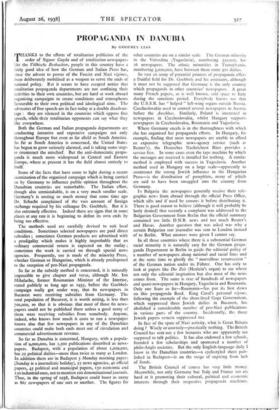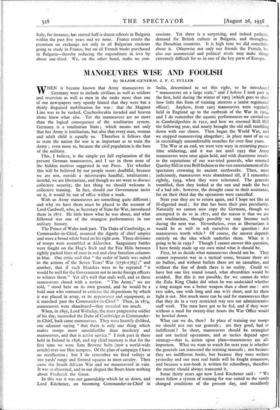PROPAGANDA IN DANUBIA
By GODFREY LIAS
THANKS to the efforts of totalitarian publicists of the order of Signor Gayda and of totalitarian newspapers like the Viilkische Beobachter, people in this country have a fairly good idea of how the German and Italian Press has, since the advent to power of the Fascist and Nazi regimes, been deliberately mobilised as a weapon to serve the ends of national policy. But it seems to have escaped notice that totalitarian propaganda departments are not confining their activities to their own countries, but are hard at work abroad organising campaigns to create conditions and atmospheres favourable to their own political and ideological aims. The advocates of free speech are in fact today at a double disadvan- tage : they are silenced in the countries which oppose free speech, while their totalitarian opponents can say what they like everywhere.
Both the German and Italian propaganda departments are conducting intensive and expensive campaigns hot only throughout Europe but even as far afield as South America. So far as South America is concerned, the United States has begun to grow seriously alarmed, and is taking some steps to counteract the mischief. But the anti-democratic propa- ganda is much more widespread in Central and Eastern Europe, where at present it has the field almost entirely to itself.
Some of the facts that have come to light during a recent examination of the organised campaign which is being carried on by Germany to influence public opinion throughout the Danubian countries are remarkable. The Italian effort, though also unmistakable, is on a very much smaller scale.
Germany's is costing so much money that some time ago Dr. Schacht complained of the vast amount of foreign xchange required by his colleague Dr. Goebbels. But it is also extremely effective. Indeed there are signs that in some places at any rate it is beginning to defeat its own ends by being too effective.
The methods used are carefully devised to suit local conditions. Sometimes selected newspapers are paid direct subsidies ; sometimes German products are advertised with a prodigality which makes it highly improbable that an ordinary commercial return is expected on the outlay ; sometimes the work is carried on through special news agencies. Frequently, use is made of the minority Press, whether German or Hungarian, which is already predisposed to the reception of pro-Nazi propaganda.
So far as the subsidy method is concerned, it is naturally impossible to give chapter and verse, although Mr. Ion Mihalache, former Roumanian Minister of the Interior, stated publicly as long ago as 1935, before the Goebbels campaign really got under way, that 6o newspapers in Bucarest were receiving subsidies from Germany. The total population of Bucarest, it is worth noting, is less than 700,000, so that it is obvious that most of those 6o news- papers could not be published there unless a good many of them were receiving subsidies from somebody. Anyone, indeed, who knows how much it costs to run a newspaper knows also that few newspapers in any of the Danubian countries could make both ends meet out of circulation and commercial advertisement revenue.
So far as Danubia is concerned, Hungary, with a popula- tion of 9,000,000, has 1,500 publications described as news- papers. Budapest, with a population of about i,000,000, has 22 political dailies—more than twice as many as London. In addition there are in Budapest 5 Monday morning papers (Sunday is a journalistic holiday), 25 news agencies, 4o official papers, 45 political and municipal papers, 150 economic and /50 industrial ones, not to mention too denominational journals.
Thus, in the spring of 1938, Budapest could boast as many as 862 newspapers of one sort or another. The figures for other countries are on a similar scale. The German minority in the Voivodina (Yugoslavia), numbering 350,000, has 26 newspapers. The ethnic minorities in Transylvania, numbering 3,000,000, have between them some 30o dailies.
So vast an army of potential printers of propaganda offers a fruitful field for Dr. Goebbels and his assistants, although it must not be supposed that Germany is the only country which propagands in other countries' newspapers. A great many French papers, as is well known, sold space to Italy during the sanctions period. Everybody knows too that the U.S.S.R. has " helped " left-wing organs outside Russia. Czechoslovakia used to control several newspapers in Austria before the Anschluss. Similarly, Poland is interested in newspapers in Czechoslovakia, whilst Hungary supports newspapers in Czechoslovakia, Roumania and Yugoslavia.
Where Germany excels is in the thoroughness with which she has organised her propaganda efforts. In Hungary, for example, finding that most newspapers are unable to afford an expensive telegraphic news-agency service (such as Reuter's), the Deutsches Nachrichten Biiro provides a service free. In some cases even the tape machine by which the messages are received is installed for nothing. A similar method is employed with success in Yugoslavia. Another method used in Hungary on a large scale—apparently to counteract the strong Jewish influence in the Hungarian Press—is the distribution of pamphlets, many of which are said to have been smuggled into the country from Germany.
la Bulgaria the newspapers generally receive their tele- graphic news from abroad through the official Press Office, which sifts and if need be censors it before distributing it. There is good reason to believe (although it will probably be hotly denied) that recently a complaint was addressed to the Bulgarian Government from Berlin that the official summary contained too little D.N.B. news and too much Reuter's and Havas. Another question that was asked was why a certain Bulgarian star journalist was sent to London instead of to Berlin. What answers were given I cannot say.
In all those countries where there is a substantial German racial minority it is naturally easy for the German propa- ganda Department in Berlin to guide the editorial policy of a number of newspapers along national and racial lines and at the same time to glorify the " marvellous resurrection " of the German nation under its Fiihrer. One has only to look at papers like Die Zeit (Henlein's organ) to see where not only the editorial inspiration but also most of the news comes from. The same is true of hundreds of newspapers and quasi-newspapers in Hungary, Yugoslavia and Roumania. Only one State so far—Roumania—has put its foot down on this propaganda flood. King Carol's personal regime, following the example of the short-lived Goga Governnient, which suppressed three Jewish dailies in Bucarest, has abolished a considerable number of pro-Nazi publications in various parts of the country. Incidentally, the three Jewish papers remain suppressed too.
In face of the spate of Nazi activity, what is Great Britain doing ? Wisely or unwisely—practically nothing. The British Council has sent out a few lecturers who are apparently not supposed to talk politics. It has also endowed a few schools, founded a few scholarships and sponsored a number of philo-Anglo societies. But the only English-language daily I know in the Danubian countries—a cyclostyled sheet pub- lished in Budapest—is on the verge of expiring from lack of fluids.
The British Council of course has very little money. Meanwhile, not only Germany but Italy and France too are hard at it promoting their cultural, political and economic interests through their respective propaganda machines. Italy, for instance, has started half-a-dozen schools in Bulgaria within the past five years and we none. France remits the premium on exchange not only to all Bulgarian students going to study in France, but on all French books purchased in Bulgaria—thereby reducing the expenditure in leva by about one-third. We, on the other hand, make no con- cessions. Yet there is a surprising, and indeed pathetic, demand for British culture in Bulgaria, and throughout the Danubian countries. It is high time we did something about it. Otherwise not only our friends the French, but also our commercial and political rivals may make things extremely difficult for us in one of the -key parts of Europe.



































 Previous page
Previous page